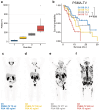Prognostic Role of PSMA-Targeted Imaging in Metastatic Castration-Resistant Prostate Cancer: An Overview
- PMID: 39457667
- PMCID: PMC11504290
- DOI: 10.3390/biomedicines12102355
Prognostic Role of PSMA-Targeted Imaging in Metastatic Castration-Resistant Prostate Cancer: An Overview
Abstract
Objectives: Prostate-specific membrane antigen (PSMA) positron emission tomography/computed tomography (PET/CT) has gained a primary role in prostate cancer (PCa) imaging, overcoming conventional imaging and prostate-specific antigen (PSA) serum levels, and has recently emerged as a promising technique for monitoring therapy response in metastatic castration-resistant prostate cancer (mCRPC) patients treated with novel hormonal therapy, taxanes, and radioligand therapy (RLT). In this review, we aim to provide an overview of the most relevant aspects under study and future prospects related to the prognostic role of PSMA PET/CT in mCRPC.
Methods: A systematic literature search was performed in the following databases: MEDLINE, PubMed, and EMBASE databases. The study focused exclusively on English-language studies, excluding papers not pertinent to the topic.
Results: PSMA PET imaging offers a higher sensitivity and specificity than conventional imaging and provides accurate staging and efficient diagnosis of distant metastases. The data presented herein highlight the usefulness of PET in risk stratification, with a prognostic potential that can have a significant impact on clinical practice. Several prospective trials are ongoing and will shortly provide more evidence supporting the prognostic potential of PET PSMA data in this clinical scenario.
Conclusions: Current evidence proves the prognostic role of PSMA PET/CT in different settings, with raising relevance also in the context of mCRPC.
Keywords: PET; PSMA; mCRPC; metastatic castration-resistant prostate cancer; prognosis; prostate cancer; prostate-specific membrane antigen.
Conflict of interest statement
The authors declare no conflicts of interest.
Figures

References
-
- Miura N., Mori K., Mostafaei H., Quhal F., Sari Motlagh R., Abufaraj M., Pradere B., Aydh A., Laukhtina E., D’Andrea D., et al. Prognostic value of testosterone for the castration-resistant prostate cancer patients: A systematic review and meta-analysis. Int. J. Clin. Oncol. 2020;25:1881–1891. doi: 10.1007/s10147-020-01747-1. - DOI - PMC - PubMed
-
- Scher H.I., Morris M.J., Stadler W.M., Higano C., Basch E., Fizazi K., Antonarakis E.S., Beer T.M., Carducci M.A., Chi K.N., et al. Prostate Cancer Clinical Trials Working Group 3. Trial Design and Objectives for Castration-Resistant Prostate Cancer: Updated Recommendations from the Prostate Cancer Clinical Trials Working Group 3. J. Clin. Oncol. 2016;34:1402–1418. doi: 10.1200/JCO.2015.64.2702. - DOI - PMC - PubMed
-
- Van den Broeck T., van den Bergh R.C.N., Briers E., Cornford P., Cumberbatch M., Tilki D., De Santis M., Fanti S., Fossati N., Gillessen S., et al. Biochemical Recurrence in Prostate Cancer: The European Association of Urology Prostate Cancer Guidelines Panel Recommendations. Eur. Urol. Focus. 2020;6:231–234. doi: 10.1016/j.euf.2019.06.004. - DOI - PubMed
Publication types
Grants and funding
LinkOut - more resources
Full Text Sources
Research Materials
Miscellaneous

